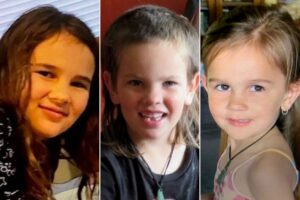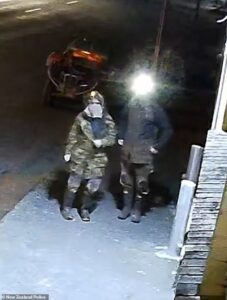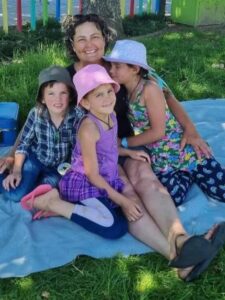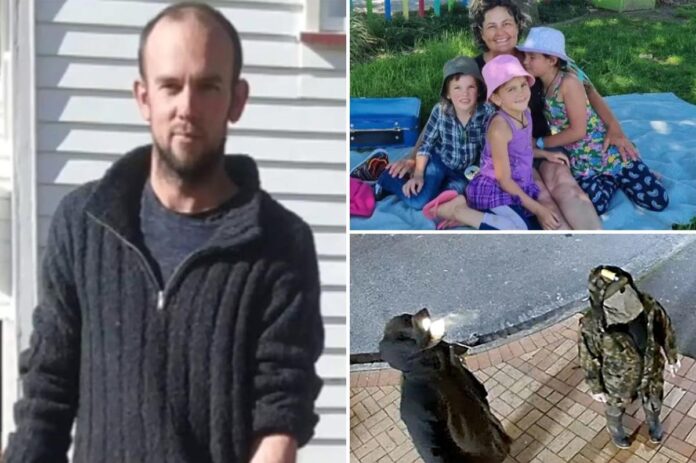“THE BLANKET THAT CHANGED EVERYTHING” — Police release new details from Tom Phillips’ hidden camp after 4 years in the wild 🌲
The object looked ordinary, yet investigators say it holds secrets about how the children lived. 👉 Full story in comments.
THE BLANKET THAT CHANGED EVERYTHING: Police Release New Details from Tom Phillips’ Hidden Camp After 4 Years in the Wild
For nearly four years, Tom Phillips and his three children—Jayda, Maverick, and Ember—lived as ghosts in the dense Waikato wilderness of New Zealand’s North Island, evading a nationwide manhunt that gripped the nation. The fugitive father, who fled with his children in December 2021 following a custody dispute, was killed by police on September 8, 2025, during a violent shootout in Piopio. The discovery of his children, now aged 12, 10, and 9, at a remote campsite brought relief but also unearthed a chilling artifact: a tattered blanket, seemingly ordinary, that police say holds secrets about the family’s survival. This unassuming object, found among the sparse belongings at their hidden camp, has reshaped the investigation into how Phillips sustained his children for 1,460 days in the wild.
The saga began in Marokopa, a small coastal settlement in Waikato, where Phillips, a skilled bushman from a farming family, was no stranger to the rugged terrain. After a bitter separation from the children’s mother, known as Cat, Phillips took Jayda, Maverick, and Ember into the wilderness, defying court orders that denied him legal custody. His first disappearance in September 2021, when his truck was found abandoned on Kiritehere Beach, sparked fears of tragedy. Yet, 19 days later, he and the children emerged from a camp 15 kilometers inland, claiming a need to “clear his head.” Charged with wasting police resources, Phillips vanished again before his January 2022 court date, this time for nearly four years, with only fleeting sightings—CCTV of break-ins, a 2023 bank robbery in Te Kūiti, and a 2024 encounter with pig hunters—hinting at their survival.

The end came abruptly. On September 8, police responded to a 2:30 a.m. burglary alarm at a PGG Wrightson store in Piopio. Phillips, accompanied by Jayda, fled on a stolen quad bike, only to hit police road spikes on Te Anga Road. As a constable approached, Phillips fired a high-powered rifle, striking the officer in the head. Return fire killed Phillips instantly. Jayda, unharmed, provided critical information that led police to a campsite 2 kilometers away, where Maverick and Ember were found in a “very remote” setup, surrounded by dense bush. The children, described as “engaged” but shaken, were taken into Oranga Tamariki’s care for medical checks, their mother expressing “deep relief” at their safety.
Police released images of the campsite on September 9, revealing a grim scene: tarpaulins draped over quad bikes, Sprite cans, a gas cylinder, and a stash of firearms and ammunition. But it was a worn blanket, found draped over a makeshift shelter, that drew investigators’ attention. Detective Senior Sergeant Andrew Saunders, speaking at a September 10 press conference, described it as “more than it seems.” Forensic analysis revealed that the blanket, patched and weathered from years in the bush, contained hidden pockets sewn into its lining. Inside were small items—maps, lists of supplies, and cryptic notes—suggesting a sophisticated system for communicating with outside supporters. “It’s clear Phillips had help,” Saunders said, noting that the blanket’s contents point to a network that supplied the family with essentials like food, batteries, and quad bikes.
The blanket’s secrets have shifted the investigation’s focus. Police now believe Phillips relied on a web of accomplices, possibly locals sympathetic to his anti-establishment stance, who left supplies at prearranged drop points. The notes, written in a shorthand code, include references to locations and items like “cans” and “batts,” likely meaning canned goods and batteries. One map sketched a route to a nearby farm, raising questions about whether Phillips used the children to collect supplies under the guise of innocence. “The blanket was a lifeline,” Saunders told media, emphasizing its role in coordinating survival without direct contact. This discovery aligns with earlier suspicions, as police had long speculated Phillips couldn’t sustain the children alone in Waikato’s harsh winters, where ground temperatures drop below freezing for nearly 50 days a year.

The children’s mother, Cat, told RNZ’s Mata programme that the years without her children were agonizing, compounded by online harassment from those who viewed Phillips as a folk hero. “They’re my world,” she said, her relief tempered by the uncertainty of when she might reunite with them due to ongoing trauma assessments. Child psychologist Dr. Sarah Watson warned that the children, who missed years of education and lived in a world shaped by their father’s paranoia, face a “tough road” to recovery. The blanket’s hidden pockets suggest they may have carried or even guarded secrets, adding layers of psychological complexity. “They’ve been taught to distrust the outside world,” Watson noted, highlighting the challenge of reintegrating them into society.
Phillips’ sister, Rozzi, offered insight into his mindset in an August 2025 interview with Paddy Gower. “He thought he was protecting them,” she said, reading a letter from their mother, Julia: “Tom, I feel so sad you thought this was the only way.” Rozzi described Phillips as a skilled outdoorsman with an “amazing sense of humour,” but one haunted by mental health struggles and a belief that the family court system was unjust. The blanket’s contents corroborate this narrative of defiance, suggesting Phillips meticulously planned his evasion, using the children’s possessions to maintain secrecy.
Public sentiment, as seen on platforms like X, is divided. Some posts romanticize Phillips as a father fighting for his children, while others condemn his actions, citing the trauma inflicted on Jayda, Maverick, and Ember. One user wrote, “Those kids lived in fear, not freedom,” reflecting growing sympathy for the children as details emerge. Police Commissioner Richard Chambers was unequivocal: “No one who does this to children, who unleashes high-powered rifles on my staff, is a hero.” The injured officer, recovering in Waikato Hospital after multiple surgeries, faces a long rehabilitation, underscoring the human cost of Phillips’ choices.

The campsite itself, one of many Phillips used, was “grim” and “cramped,” with tarpaulins and camouflage netting concealing a dugout tent. The blanket, likely one of the few comforts the children had, was both a practical tool and a symbol of their isolation. Its hidden pockets suggest Phillips trained his children to live covertly, possibly instructing them to hide or deliver messages. This raises ethical questions about their agency and exposure to his alleged crimes, including the 2023 bank robbery and recent break-ins. Police are now scouring the campsite for further evidence, with Saunders vowing to “hold accountable” those who aided Phillips.
As New Zealand processes this tragedy, the blanket stands as a haunting artifact of a family’s survival and a father’s desperate rebellion. For Jayda, Maverick, and Ember, it was a shield against the cold, but also a repository of secrets that shaped their lost years. The investigation continues, with police analyzing the blanket’s contents to trace Phillips’ network and understand how he evaded capture for so long. For the children, now in protective custody, the blanket that changed everything marks the end of their wilderness ordeal—and the beginning of a long journey home.



